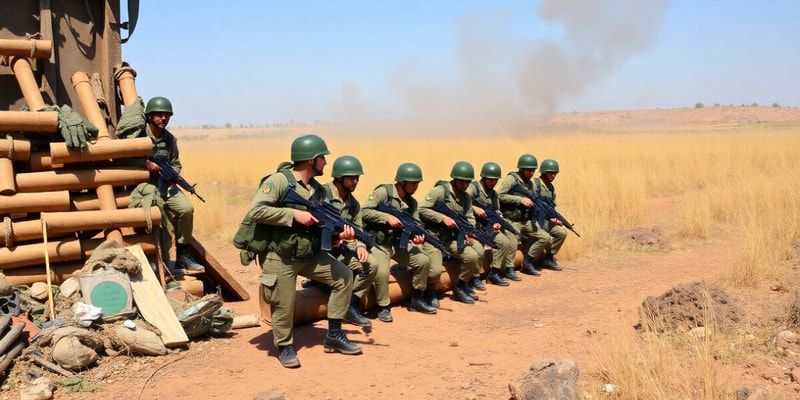Podcast
Questions and Answers
What are the main purposes of International Humanitarian Law (IHL)?
What are the main purposes of International Humanitarian Law (IHL)?
Which historical event significantly influenced the establishment of the International Committee of the Red Cross (ICRC) and the first Geneva Convention?
Which historical event significantly influenced the establishment of the International Committee of the Red Cross (ICRC) and the first Geneva Convention?
What distinguishes jus ad bellum from jus in bello?
What distinguishes jus ad bellum from jus in bello?
What was the main purpose of the Geneva Protocol of 1925?
What was the main purpose of the Geneva Protocol of 1925?
Signup and view all the answers
What major advancement in IHL occurred after World War II?
What major advancement in IHL occurred after World War II?
Signup and view all the answers
What is one of the main functions of the ICRC?
What is one of the main functions of the ICRC?
Signup and view all the answers
Which term refers to the concept that there can be no crime without a law?
Which term refers to the concept that there can be no crime without a law?
Signup and view all the answers
What was a major criticism of the Nuremberg and Tokyo Tribunals?
What was a major criticism of the Nuremberg and Tokyo Tribunals?
Signup and view all the answers
Which function involves the ICRC defending International Humanitarian Law against legal developments that might undermine it?
Which function involves the ICRC defending International Humanitarian Law against legal developments that might undermine it?
Signup and view all the answers
What do the terms Nullum poene sine lege imply?
What do the terms Nullum poene sine lege imply?
Signup and view all the answers
What aspect does the 'Direct action function' of the ICRC focus on?
What aspect does the 'Direct action function' of the ICRC focus on?
Signup and view all the answers
What is a significant role of the International Law Commission in the context of ICL?
What is a significant role of the International Law Commission in the context of ICL?
Signup and view all the answers
What does the ICRC promote as part of its advocacy function?
What does the ICRC promote as part of its advocacy function?
Signup and view all the answers
Study Notes
International Humanitarian Law (IHL)
- Part of international law, limiting conduct and effect of armed conflict
- Protects those not participating in conflict
- Applies to all armed conflicts (international and non-international)
- Often disregarded despite being widely accepted
IHL History
- Battle of Solferino crucial to creation of ICRC and Geneva Convention (1864)
- Henry Dunant witnessed inadequate medical care, proposing neutral aid societies and international agreements to protect wounded soldiers and medical personnel
- ICRC formed in 1863
- First Geneva Convention adopted in 1864
- Law of the Hague (1899), Law of Geneva (1907)
- Legality of war vs. conduct during war
- WW1: Industrialization, chemical warfare led to Geneva Protocol (1925) prohibiting chemical/biological weapons
- Increased prisoner of war captivity led to a POW convention in 1929
- Public outrage over chemical weapons use
- WW1 influenced expansion and revisions of existing treaties
- WW2: development of the Geneva Conventions (1949) and Additional Protocols (1977)
How IHL is Enforced
- Rules taught to armed forces and general public
- Prevention and punishment of violations
- Enactment of laws punishing war crimes
Rules of the ICRC
- Founded in 1863, based on Henry Dunant's principle of humanity
- Declared army medical services neutral with distinctive emblems
- Formed voluntary relief societies to act as auxiliaries to medical services
- ICRC: neutral, impartial, independent humanitarian organization; mandated by states party to protect victims of armed conflict
- Upholding IHL, investigating alleged breaches
ICRC Functions
- Monitoring: adapting IHL to reflect conflict realities
- Catalyst: Stimulating discussion of problems
- Promotion: advocating for IHL, disseminating knowledge
- Guardian angel: defending IHL against developments that counter it
- Direct action: contributing to IHL application
- Watchdog: raising alarms on serious violations
History of International Criminal Law (ICL)
- WW2 (Nuremberg and Tokyo Tribunals): addressed tyranny and human dignity violations
- Criticisms include victor's justice, lack of fair trial rights.
- Nullum crimen sine lege, Nullum poena sine lege
- Violations of state sovereignty, use of death penalty
Present of ICL
-
International Criminal Court (ICC): permanent court in this field, addressing conflicts worldwide using tribunals.
-
Purpose: criminal responsibility for individuals committing international concern crimes
-
Main mechanisms:
- National, hybrid, international alternative accountability mechanisms (IIIM, IIMM, UNITAD)
-
IHL Purpose: Regulates conduct in armed conflict, protects civilians.
-
ICL Purpose: Individual criminal responsibility for crimes of international concern
- Main Instruments: Geneva Conventions (GCs), Additional Protocols (APs), Rome Statute.
Human Rights Law
- Purpose: individuals and groups vis-à-vis governments; certain rights accrue to them
- Main Instruments: ICCPR, ICESCR, CERD, CAT, CEDAW, CRC, CMW, CEED, CRPD
Studying That Suits You
Use AI to generate personalized quizzes and flashcards to suit your learning preferences.
Related Documents
Description
Explore the principles and history of International Humanitarian Law (IHL), which seeks to limit the effects of armed conflict and protect those not participating in wars. Learn about its development, key events like the Battle of Solferino, and significant treaties that shaped its application. This quiz delves into the evolution of IHL and its relevance in contemporary conflicts.



